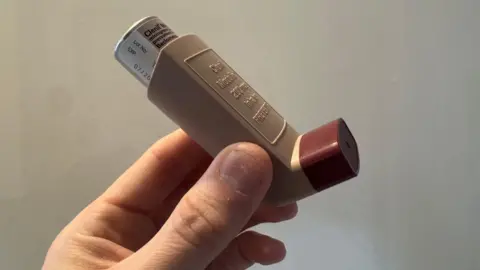Afternoon inhaler puff may be best - study finds
 BBC
BBCA mid-afternoon puff of a preventer inhaler could be the best way for a person with asthma to keep their symptoms under control, a new study has found.
Experts at the University of Manchester found if a person takes their brown inhaler between 15:00 and 16:00 BST they may see symptoms improve.
The authors say the study is the first to show the importance of coordinating asthma treatment with a person's body clock - also known as circadian rhythms.
Dr Erika Kennington, from charity Asthma and Lung UK, said the findings show changing the time of day you take your inhaler "may have a huge impact on your medication's effectiveness".
She said: "It's incredible to think that something so easy as switching the timing of your inhaler dose to the afternoon, has the potential to improve your symptoms and ultimately could save your life."
'Significant'
Researchers examined 21 patients with asthma who were asked to take their medication in three different ways on three separate weeks.
These included a once-daily dose of 400mg between 08:00 and 09:00, a once-daily dose between 15:00 and 16:00.
The final group took half a dose between 08:00 and 09:00 and a second half dose between 20:00 and 21:00 - the "usual" pattern of dosing in the UK.
All patterns appeared to improve asthma control, but the once-daily afternoon dose appeared to improve night-time lung function and lead to a better blood biomarker for airway inflammation.
Experts called for further larger trials to confirm the findings.
"Up to three-quarters of patients experience worsening symptoms overnight and up to 80% of fatal asthma attacks occur at night," said Dr Hannah Durrington from the University of Manchester and Manchester University NHS Foundation Trust.
The study shows aligning the use of their brown or preventer haler with their body clock can have "significant impacts on treatment outcomes".
Listen to the best of BBC Radio Manchester on Sounds and follow BBC Manchester on Facebook, X, and Instagram. You can also send story ideas via Whatsapp to 0808 100 2230.
